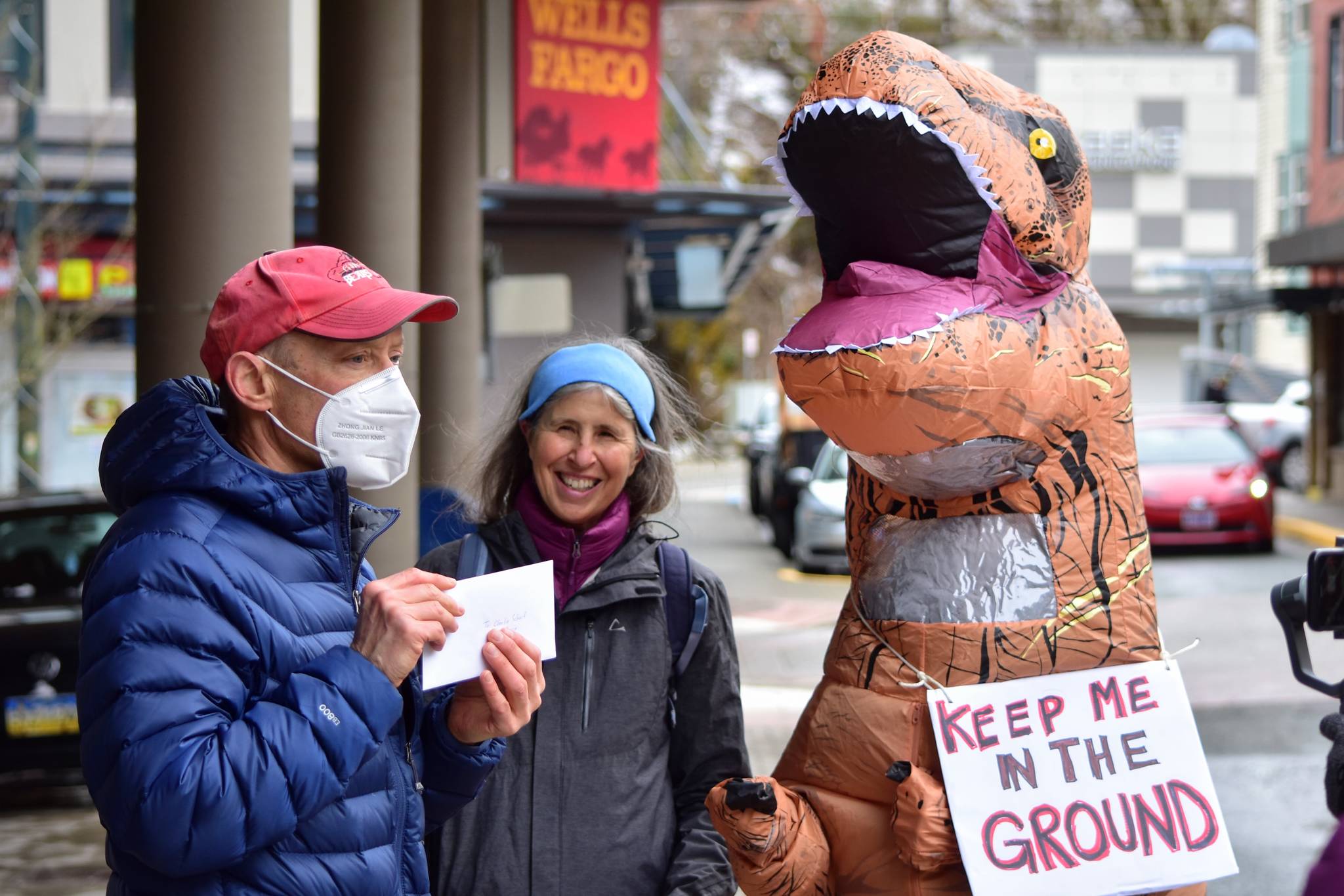This article has been updated to better reflect the source of information regarding Wells Fargo’s investments in fossil fuel and 350Juneau’s letter was ultimately accepted by bank staff.
Environmental protestors, including one dressed as a dinosaur, delivered a letter to Wells Fargo CEO Charles Schraf asking the bank to divest from the fossil fuel industry.
Climate activists from 350Juneau — who hold weekly rallies in Courthouse Plaza across the street from the state Capitol building —took a short walk to Wells Fargo’s branch on Second Street in downtown Juneau. One demonstrator, Dick Farnell, wore a full-body suit of a Tyrannosaurus rex with a sign reading “Keep me in the ground.”
In the letter, the group lauded the bank’s published commitment to reducing greenhouse gas emissions including a goal of net zero emissions by 2050, interim emissions targets set by 2022 and a commitment of $500 billion in finance to sustainable energy by 2030. But at the same time 350Juneau was critical of the bank’s continued support for fossil fuel extraction, including a pipeline replacement project in Minnesota.
“We watch actions, we read and analyze financial reports, we track loans and investments, and we evaluate the truthfulness of public statements,” 350Juneau’s letter stated. “We genuinely wish to work with you. Responsible financial services are essential for an equitable, just, and democratic society.”
The branch manager did ultimately accept the letter after a brief conversation, said Doug Woodby, co-chair of 350Juneau.
Wells Fargo continues to bank with a number of customers in the traditional energy sector, including in Alaska, said E.J. Bernacki, a sustainability spokesperson for the bank, and isn’t necessarily ready to divest.
[Webinar series explores climate change in Southeast Alaska and national politics]
“We do believe in engagement rather than divestment,” Bernacki said in a phone interview Friday. “We believe in working with our customers in these sectors to help with the transition (to clean energy).”
Bernacki pointed to the company’s goals and said the company had integrated social and environmental impacts into its planning. The amount of investment and financing in fossil fuel industries is declining, according to data collected by the Rainforest Action Network, and Bernacki said the company is also hearing environmental concerns from its investors. Wells Fargo set up a task force to examine the company’s climate-related activities and address concerns related to environmental impacts.
While the 350Juneau activists praised the bank’s goals, they at the same time expressed skepticism those stated ambitions would translate into meaningful change.
“It depends on what they really mean they’re going to do,” Woodby said.
Woodby and co-chair Elaine Schroeder said large companies often make lofty promises while continuing the same problematic behavior, a process Schroeder called “greenwashing.”
The Rainforest Action Network, which tracks funding for the fossil fuel industry, ranks Wells Fargo second in terms of overall funding for the sector, behind JPMorgan-Chase.
Despite their reservations, the 350Juneau activists saw Wells Fargo’s goals as something of an affirmation of their claims. Wells Fargo and other large institutions have recognized the importance of climate change, Schroeder said, and are naturally moving their money away from fossil fuels.
“It’s not a growth industry,” Schroeder said.
• Contact reporter Peter Segall at psegall@juneauempire.com. Follow him on Twitter at @SegallJnuEmpire.

